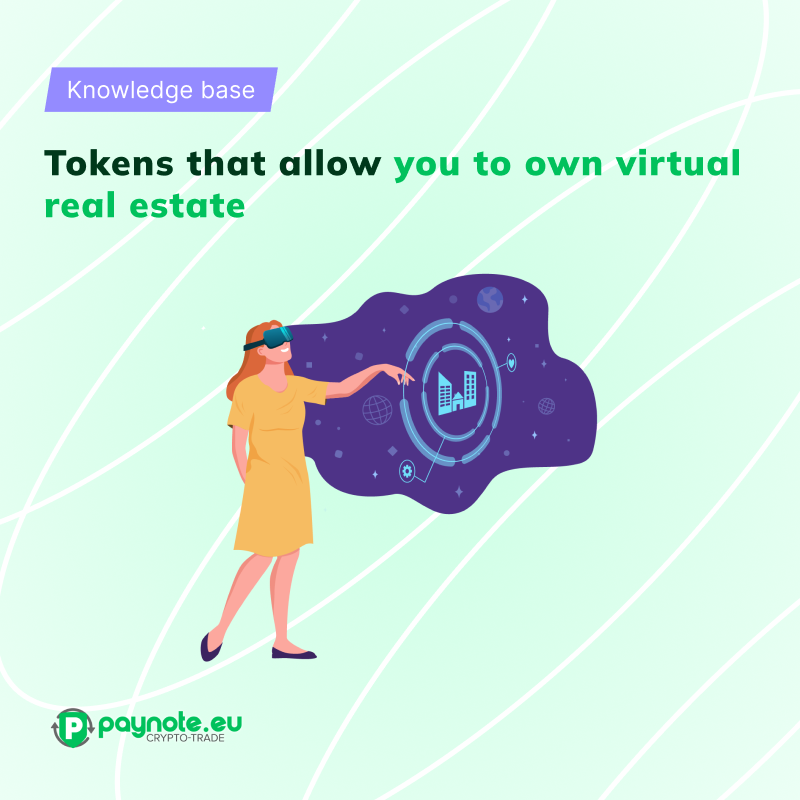Blockchain technology has long penetrated various areas of our lives. One of the most interesting and promising areas of blockchain application is the ownership of virtual real estate. This opens up new opportunities for decentralized virtual worlds, games, and investments. To implement this idea, special tokens are used. Let’s take a closer look at what tokens for virtual real estate are.
What are virtual real estate tokens?
Virtual real estate tokens are digital assets that represent virtual objects or pieces of real estate in the digital world. They are built on blockchain technology and can be used for a variety of purposes, including owning, exchanging and investing in virtual real estate.
Virtual real estate can inсlude digital land plots, virtual houses, offices, shops and other objects. These objects can be found in various virtual worlds and games, and they become valuable assets for those who own the corresponding tokens.
How do virtual real estate tokens work?
Tokens for virtual real estate operate on the basis of blockchain technology, which ensures transparency and security of transactions. Owners of tokens can exchange, sell or rent virtual objects, just like real estate in the real world.
The process of creating tokens for virtual real estate usually includes the following steps:
- Platform Selection: Blockchain platforms such as Ethereum, Binance Smart Chain, or others are usually used to create tokens. Each platform has its own features and advantages.
- Token Creation: Special smart contracts create tokens that represent virtual objects or real estate. These smart contracts define the rules for using tokens and the exchange mechanisms.
- Registering Ownership: Once tokens are created, they can be registered on the blockchain, allowing ownership to be established and owners identified.
- Exchange and transactions: Owners of tokens can exchange them for various virtual real estate objects or sell them to other users.
- Investment: Virtual real estate tokens also provide investment opportunities. Users can purchase tokens with the hope that their value will increase.
Examples of platforms for owning virtual real estate
There are many platforms that provide the opportunity to own virtual real estate using tokens. Some of them inсlude:
- Decentraland : This is a virtual world where users can buy and sell digital plots of land and create their own virtual worlds on them. MANA tokens are used to transact and own virtual real estate.
- CryptoVoxels : This is a platform for creating and selling virtual real estate such as houses, shops and galleries. Tokens for real estate ownership are called “LAND”.
- The Sandbox : This platform allows users to create and manage their own virtual worlds. Here, “SAND” tokens are used to own and invest in real estate.
Prospects for using tokens for virtual real estate
The use of tokens for virtual real estate opens up a number of interesting prospects. Here are some of them:
- Decentralized Markets : Virtual real estate tokens allow the creation of decentralized markets where users can trade virtual real estate without intermediaries.
- Gaming Industry : Many games are already starting to use tokens to own in-game real estate, which creates new game mechanics and opportunities for players.
- Investment : Virtual real estate tokens can become an investment and their value can increase over time.
- Virtual education and entertainment : Ownership of virtual real estate can also be used for educational and entertainment purposes, creating new forms of virtual worlds and activities.
Risks and challenges
Despite all the promise associated with virtual real estate tokens, there are also risks and challenges. For example, technical issues related to security and scalability may be barriers to widespread adoption of this technology. Additionally, regulatory issues may arise as existing legal systems may not cope with digital real estate.
Conclusion
Virtual real estate tokens are an exciting and innovative development in the world of blockchain and cryptocurrencies. They allow users to own virtual objects and real estate, creating new opportunities for investment, games and virtual worlds. However, as with any new technology, it is important to consider the risks and challenges associated with these innovations. With the development of blockchain technology and growing interest in virtual real estate, we can expect even more diversity and dynamics in this area.










